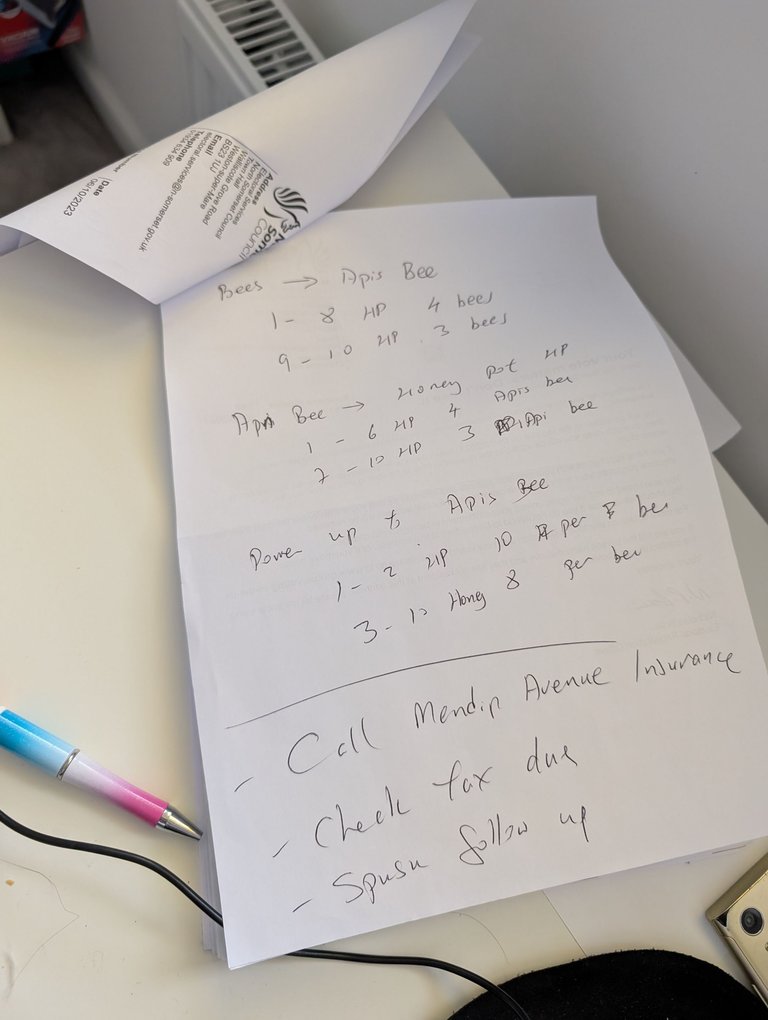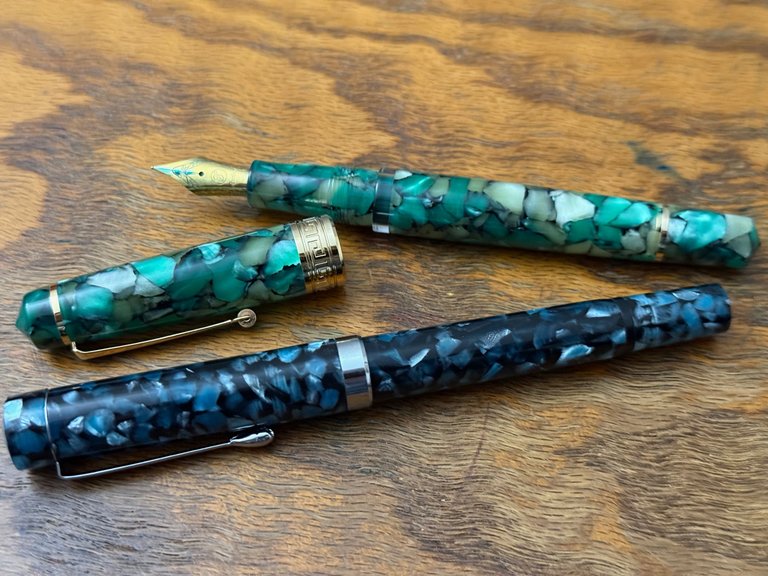
I have a bit of an idea here. I'm sure it's one at least some of you share, likely one you share even if you don't walk the walk so to speak. You'll see what I mean by that when I get into it. I'm not quite sure if I have my idea in enough of a working order to make a coherent argument about it or not. So I'm just going to jump in and out of it and see if I can make sense of my thoughts.
I think handwriting is important. Of course, many of you know I am a fountain pen user and that I often begin these posts, sometimes writing the entire first draft of a post, longhand with my fountain pen. That in mind, I'm sure there is some bias to my beliefs here, but I think it's also fairly non-biased and based on some degree of fact and study.
There is a pretty big difference between writing a letter and pushing a keyboard key. The shape of the letter will vary and the stroke order will differ; some may be similar, but all are unique. With a keyboard, however, every letter or symbol is exactly the same: just pushing down. Muscle memory is a thing and I think forming letters helps not only memory, but helps activate learning. There is some evidence for this. Some studies have shown that people who handwrite notes in class are able to recall the material and do better on tests than people who use a laptop to take the notes.
Yes, a laptop allows you to record more of the things the teacher says, but, well... that's just it. By typing down everything said, there is less thinking involved, whereas when handwriting, one must be more selective in what is written down, and this selection process involves more thinking. That thinking aids learning, which may be why the somewhat paradoxical result of more complete notes taken with a laptop equalling worse performance than handwriting.
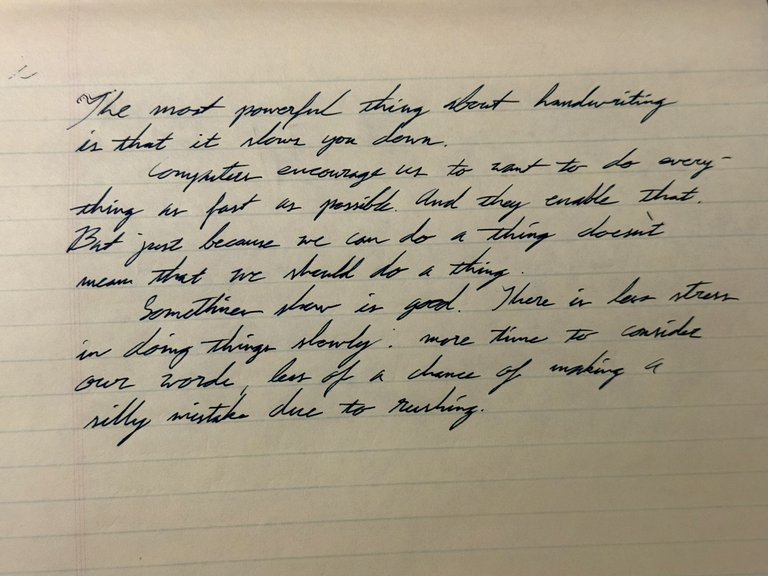
If you can't read the cursive, it says:
The most powerful thing about handwriting is that it slows you down.
Computers encourage us to want to do everything as fast as possible. And they enable that. But just because we can do a thing doesn't mean that we should do a thing.[1]
Sometimes slow is good. There is less stress in doing things slowly: more time to consider our words, less of a chance of making a silly mistake due to rushing.
I guess that kind of goes along with the study I mentioned above. We all want to go fast because we want to do everything. There are only so many hours in the day, after all, and it always seems like we don't have enough to do everything we want to do. This feeling is especially strong after we have kids. But moving fast causes stress, and often instead of doing a few things well, we end up doing everything in a rushed, low quality way, and we feel stressed all the while. Maybe this has something to do with the low quality of things today and all the mental problems in society. Maybe not, I don't know, but maybe there is a connection.
And yeah, there is the cursive too. I know my writing is not very good, but a generation ago most people would have been able to read it simply because everyone wrote in cursive and were more practiced at reading it. These days, the number of people who can read even really good cursive written by a professional calligrapher is shockingly low.
I read a help wanted advertisement from the US national archive a week or so ago that was begging for volunteers to help them transcribe old Civil War and Revolutionary War era letters. So many people can no longer read them. Now maybe important history has all been put into computers and books already, but maybe not. Either way, we are losing a connection to our past.
Another bit on the slowness of handwriting:
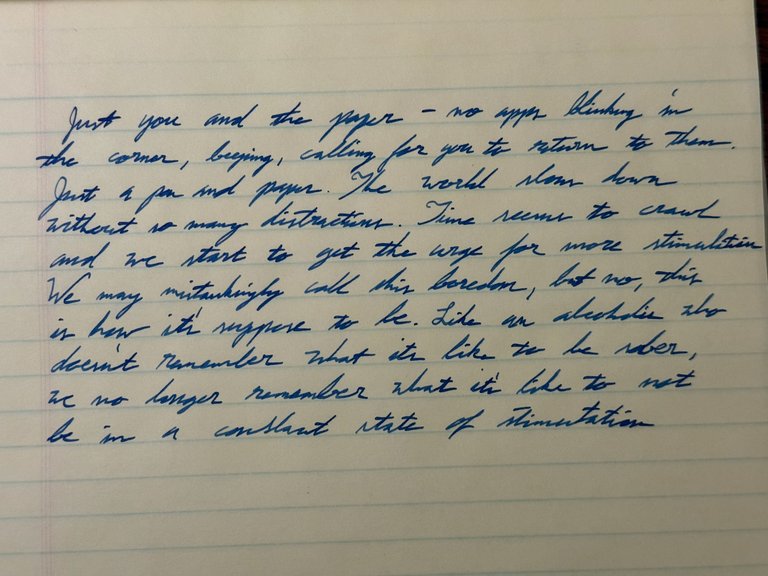
Again, a transcription for the cursively challenged:
Just you and the paper—no apps blinking in the corner, beeping, calling for you to return to them. Just a pen and paper. The world slows down without so many distractions. Time seems to crawl and we start to get the urge for more stimulation. We may mistakingly call this boredom, but no, this is how it's suppose to be. Like an alcoholic who doesn't remember what it's like to be sober, we no longer remember what it's like to not be in a constant state of stimulation.
That may sound like some of the things I've written about mindfulness practice and meditation over the years. There certainly is some overlap. I don't think it's an accident that traditionally we spoke of "meditating" on an idea, which usually meant writing in a journal in a quiet study.
As I always mention, I think the incredible popularity of ASMR has something to do with this. We all desperately want the calmness of slowness, or deliberateness, of single actions, as opposed to the multitasking we do in most of our life. ASMR gives this, and it's incredibly appealing, as evident by the numbers these videos get. Handwriting gives this focused action. It's just you and the paper, usually with some degree of scratching (especially if you are using a fountain pen nib) and tactile feedback. You can hear and feel as you write the words on the page. All your senses are involved in handwriting.
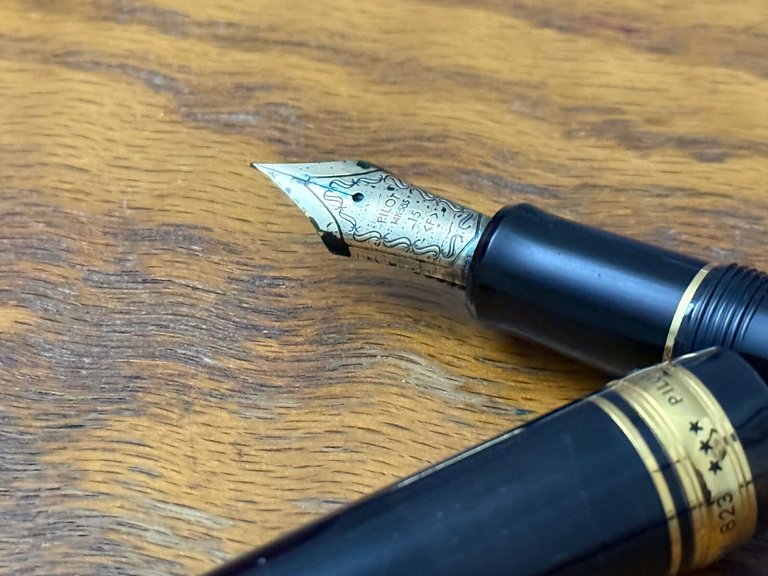
Many people I meet always tell me they agree with me and feel the same way, even as most of them rarely handwrite themselves and are forgetting cursive. I feel like there is another similarity with meditation here, in that everyone agrees it is good and wants to do it, but no one feels they can make the time to actually do it.
What do you think? If you agree with me, why not try to handwrite a reply—write something on a scrap of paper, take a photo, and post it?
❦
 |
David is an American teacher and translator lost in Japan, trying to capture the beauty of this country one photo at a time and searching for the perfect haiku. He blogs here and at laspina.org. Write him on Mastodon. |

